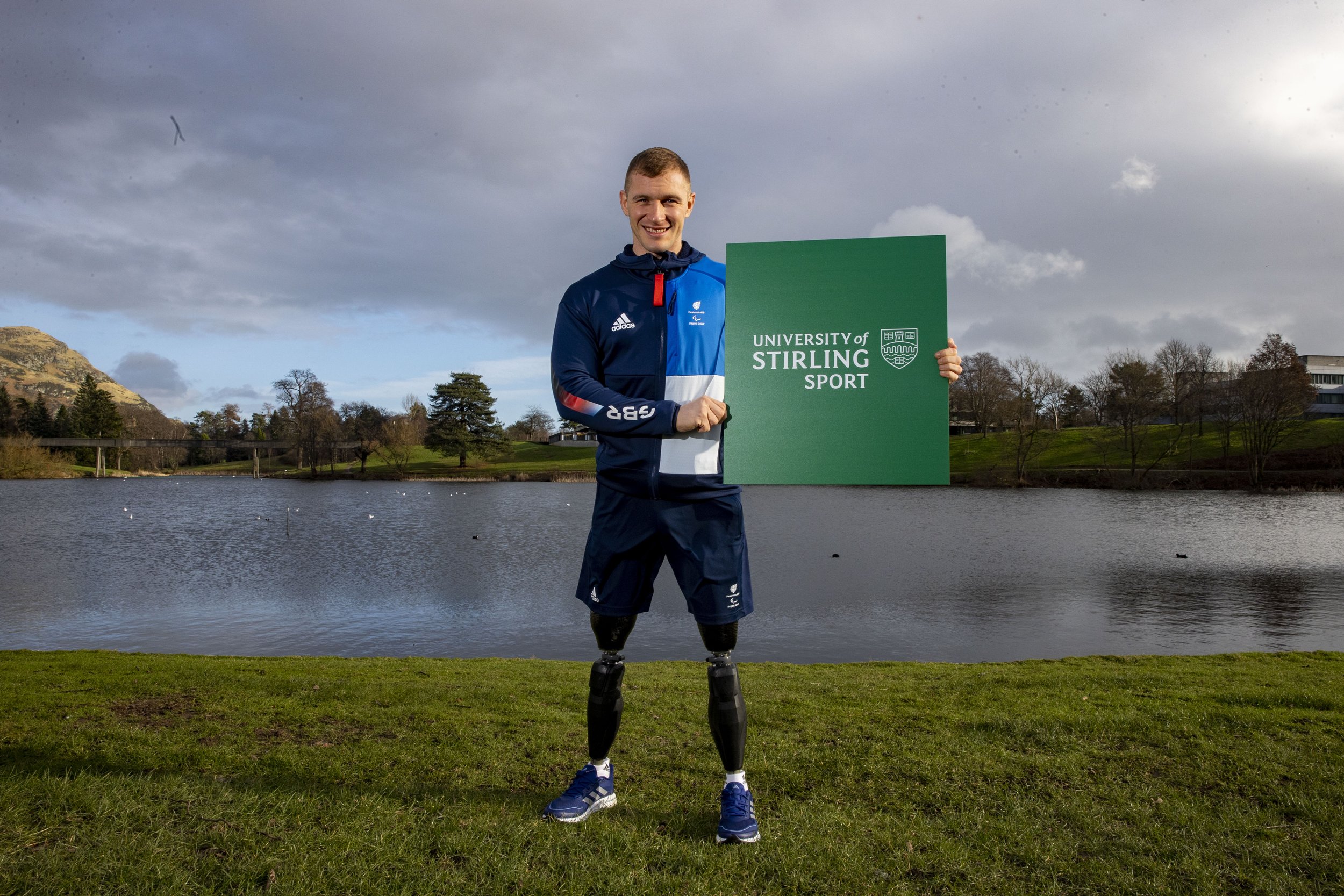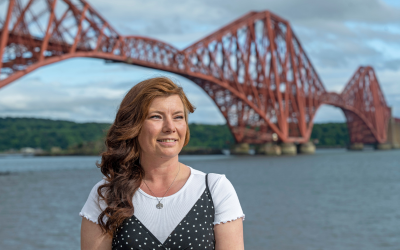LESSONS
No wrong path
Very few people here progressed from school to university in one easy step. There are many routes into university and no “wrong” or “right” way to go about it. Universities are the strongest advocates of lifelong learning and work hard to create a diverse range of opportunities for all ages and stages of life.
Inclusive opportunities for “mature” learners, progression from college and second chances – all are vital elements to the achievement of the 2030 access goals.
many routes lead to university
Scott, Catriona and Graham share the fact they left school with few or no qualifications, which at the time meant university wasn’t a serious consideration for them. Josh is candid that he needed time to mature first. However, they each prove there are many routes back – with the Open University, university bridging programmes and graduate apprenticeships as just three examples of different journeys based on their experience.
Both Anne and Josh credit two different bridging programmes for mature learners for their journey into university.
College is an important way into university for many people, including those who have been out of education for some time. Carol believes that greater promotion of the college to university route is key as the jump straight to university is daunting.
Meet them
University of Stirling
Open University in Scotland
Abertay University
Robert Gordon University
Scotland’s Rural College
Abertay University
University of the Highlands and Islands
University of the West of Scotland
Glasgow Caledonian University
University of the Highlands and Islands
Open University in Scotland
Royal Conservatoire of Scotland
ANNE EVERETT-OGSTON
Mental Health Nurse
Abertay University
— Why did you want to go to university?
I had been out of education for many years, and I had doubts about whether university was for me…and I believed that it was perhaps it was too late in life to pursue it.
Luckily, I happened to attend an open night at Abertay where I learned about AHEAD (Access to Higher Education at Abertay Dundee), a course designed to help people get back to education. The warm and inviting atmosphere, coupled with the friendliness of everyone I encountered that night left a lasting impression and I felt inspired to give the course a try. AHEAD proved to be a brilliant stepping stone, setting me up for my studies in Abertay’s Mental Health Nursing Programme.
Anne was a mature student who graduated in 2022 and now works in a crisis centre in dundee.
— In your experience, what more needs to be done to reach Scotland’s 2030 target to equalise access to university?
We need more access courses like AHEAD out there to empower and inspire confidence in those who have been out of education for a while or haven’t necessarily been “academic”. Abertay were great at recognising that some of these very people in my class were going to be brilliant at the practical aspects of careers such as Mental Health Nursing.
We also need to find ways to reduce society’s perception that Uni is just for well-off, middle-class kids. I’m originally from Canada, where life-long learning seems to be more normalised…but here, I meet a lot of people, still in their early twenties who believe they’ve missed their chance at university and are unaware they can still study for free.
"My experience at Abertay has been life-changing. I now have a very rewarding career.
CAROL HUNTER
health and wellbeing advisor
The Open University in Scotland
Carol left university after a year and it was 14 years before she went back as a mature student.
— What was your motivation to go to university/why did you want to go to university?
I attended a traditional university after High School, but dropped out after year one as I really struggled given my FASD (Foetal Alcohol Spectrum Disorder) and care experienced background.
When my Dad passed away in 2014 he encouraged me to get back into Education and use my life experiences to help others. So, in 2015 I enrolled into Fife College to do a HNC Social Care course. After this I enrolled onto the HND Social Sciences. When I completed this my tutor spoke to me about the Open University and I should consider doing their BA Social Sciences Degree.
— What was the most helpful thing the university did for you?
The Open University opened up so many doors for me. They supported me with my FASD and care identity and encouraged me to share my journey with others. They accepted me for me and believed in me – allowing me to flourish and reach my full potential.
— What do you think your younger self would think about where you are now?
My younger self would not believe what I have achieved to date, as from a young age and due to my FASD I was told that I would not achieve anything academically or socially, yet here I am!
I would advise my younger self not to lose hope, there is no wrong path when it comes to education.
“there needs to be more awareness of The Open University and of the college route into university. I’m shouting about it all that I can.”
“I would advise my younger self not to lose hope, there is no wrong path when it comes to education.”
— In your experience, what more needs to be done to reach Scotland’s 2030 target to equalise access to university?
Your education experience should not be based on where you have come from or your parents status within the community. Each and every child and young person should be given the same experiences and opportunities. From ensuring that there is accessible funding, accommodation and a curriculum that is accessible to all is crucial.
The cost-of-living crisis has made things more difficult recently for students and is impacting their mental health, creating access and retention consequences. We need to be responsive to this, creating short term solutions such as discretionary funding and long-term support with regarding to student Maintenace support.
Promoting the college to university route (like the route i took between Fife College and the OU) as these are more supported routes for those from disadvantaged backgrounds, as the jump straight to university is daunting. With articulation routes, students gain a qualification each year of the way (HNC, HND) rather than potentially dropping out like I did with nothing to show for it.
I think there needs to be more awareness of The Open University and of the college route into university. I’m shouting about it all that I can.
Carol’s studies were funded by a Part-Time Fee Grant and she combined her coursework and assessments with full-time work.
Carol now works at Fife College as their health and wellbeing adviser and part time for Adoption UK, working with children and young people from kinship, FASD and adoptive backgrounds.
“I was told that I would not achieve anything academically or socially, yet here I am!
Catriona Stevenson
SEQual Manager
Robert Gordon University
Catriona studied for her Graduate Apprenticeship whilst continuing to work for her employer.
— What was your motivation to go to university/why did you want to go to university?
University wasn't initially a consideration for me as I faced challenges during my school years and lacked a clear direction in what I wanted to do. I discovered RGU Graduate Apprenticeships while exploring career development opportunities with my employer. Previous attempts to secure employment were often hindered by lack of a degree, and the GA program provided a unique opportunity to study while working, with the practical elements of the degree more suited to my learning style.
— What advice would you give your younger self or what do you think your younger self would think about where you are now?
Don’t give up and listen to your gut – it’s not often wrong. I think my younger self would be very proud to see just how far I have come faced with many challenges.
— In your experience, what more needs to be done to reach Scotland’s 2030 target to equalise access to university?
I think the introduction of the Graduate Apprenticeship programs across universities will support young people from economically disadvantaged backgrounds to attend university allowing them to work and earn an income. The challenge and focus should be getting employers to recognise the benefits of employing young people and supporting them through a Graduate Apprenticeship program.
Catriona graduated in 2023.
"the GA program provided a unique opportunity to study while working, with the practical elements of the degree more suited to my learning style.”
“My younger self would never have seen me pursuing higher education as it was so out of reach when I was young.”
Scott Meenagh
Graham Cochrane
environmental management
Scotland’s Rural College
Graham returned to HE as a mature student, after working for 20 years.
— What was your motivation to go to university?
Adjusting from almost 20 years of full-time work into full time education was a daunting prospect. I toyed with the idea for years, but I lacked the self-esteem that I could apply and commit myself to studies. I’ve worked full-time in various roles since leaving high school, and it has been in more recent years that my love for the outdoors made me rethink my career and what I would like to focus on in the future. That is to help conserve outdoor spaces and the environment for future generations.
— What was the most supportive thing the university did for you?
One of my lecturers noticing my enthusiasm and pointing that out to me, really gave me the boost I needed to hit the ground running on the first day of term. It wasn't something I'd had before in an educational environment.
— In your experience, what more needs to be done to reach Scotland’s 2030 target to equalise access to university?
I think entry requirements should be based around showing personal interest, engagement, passion and dedication for a subject rather than just academia. Having worked in some of the most disadvantaged areas of Scotland, I think targeted outreach in these areas and a presence of universities or colleges is necessary for people from disadvantaged backgrounds to feel like further education is accessible to someone like them.
"Passion and enthusiasm are something I am happy to have found now through studying.”
Josh raybould
Forensic Sciences
Abertay University
Josh is a mature student.
— What was your motivation to go to university?
I chose to pursue further education following a decade of work after leaving high school. I realised I was in a mature enough head space to properly apply myself and wanted to study a topic that would give me the knowledge and transferable skills to obtain a career I’d enjoy. Until that point, I’d worked several different jobs in sectors I wasn’t passionate about. On top of this, my previous experiences with education weren’t that great and I struggled to commit to applying myself when I was younger, so university felt like a great way to challenge myself and prove that I could do it.
— What was the most helpful thing the university did for you?
My university has offered me so many opportunities for both academic and independent improvement. I’ve been involved in research schemes which have given me access to my own lab for projects, networking events with industry experts facilitated by academics and my division, guest lectures with national experts in my specific field, and optional careers development modules which are recorded on my transcript, demonstrating competency in specific skills that employers look for.
“my previous experiences with education weren’t that great and I struggled to commit to applying myself when I was younger.”
— In your experience, what more needs to be done to reach Scotland’s 2030 target to equalise access to university?
There needs to be a larger outreach and better integration of universities into both colleges and high schools across Scotland, and not just within the immediate proximity of a given university. In my opinion, the current routes available to individuals looking to enter university via college are fantastic and need to be better broadcast to students who may not feel university is right for them.
I believe certain psychological aspects can impede an individual’s perception of deserving a specific education, I strongly believe that the pretentiousness and elitism within some academic environments needs to be eliminated to make education available to all.
Josh left school in 5th year and tried college and various jobs until he was 26. He started at Abertay through Scottish Wider Access Programme, an initiative specifically designed for adults who are returning to education after a gap. He articulated into a BSc Forensic Sciences programme. Looking ahead to graduation in the summer, Josh has decided to pursue a career in the field of analytical chemistry.
“There needs to be better integration of universities into colleges and high schools across Scotland, and not just within the immediate proximity of a given university.”
“I realised I was in a mature enough headspace to properly apply myself.”
Scott Meenagh
history
University of Stirling
Scott is a Team GB Paralympic athlete and his route into HE was through the Open University.
— What was your motivation to go to university/why did you want to go to university?
I left school with no qualifications. In 2017, I began to study through the Open University whilst I was training and competing, then the pandemic allowed me the opportunity to finally study full-time through the provision of online learning at Stirling.
I want to make up for some of the skills I missed out on when I was younger by gaining my university degree.
— In ten years’ time what part of your university experience do you think will be most useful to you?
The ability to process information effectively, read widely and objectively, and communicate concisely across different forms of media.
— What do you think your younger self would think about where you are now?
My younger self would never have seen me pursuing higher education as it was so out of reach when I was young. I am proud that I have persisted, and hopefully make my children proud by achieving my degree.
"I want to make up for some of the skills I missed out on when I was younger by gaining my university degree.”
chloÉ mcroberts
Social Worker
Glasgow Caledonian University
With a non-traditional route to university, including being unable to read or write when she left school, Chloe graduated with first class honours in Social Work.
colleen Bell
Filmmaker
Royal Conservatoire of Scotland
Colleen was an estranged student who since graduating in 2022 has begun her successful filmmaking career, including nominations for Royal Television Society Awards.
Wayne Willoughby
Integrated Health and Social Care
University of the West of Scotland
Wayne is a recovering addict from an SIMD20 area who grew up in care and wanted to expand his experience of social care through education.
Jennifer Mewes
University of the Highlands and Islands
Literature and theology
A mature student, Jennifer is studying at HTC, a UHI partner, and values the flexibility virtual learning offers her.
Denny Pereira
Business Administration (executive)
University of the Highlands and Islands
Denny began his studies at UHI Perth completing a HND in Professional Cooking, before securing a BA (hons) in Event Management and he is now studying for his MBA.
Leeanne Macpherson
Leeanne attended college as a mature student, securing work as an NHS Nursing Assistant, before balancing this role with studying for her degree in Mental Health Nursing.
Open University in Scotland




































